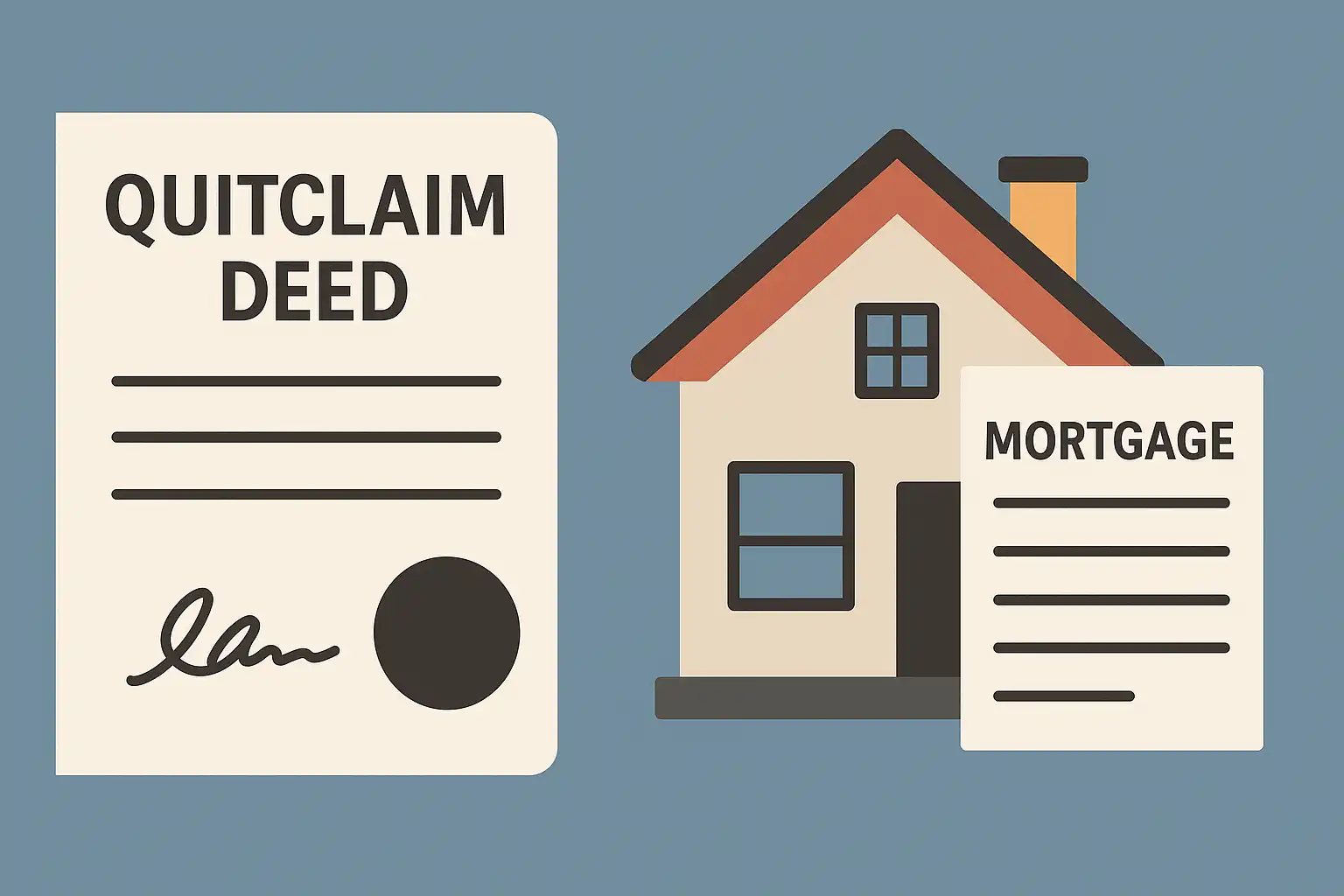
One of the most common misconceptions about quitclaim deeds involves their relationship with existing mortgages. Many property owners believe that adding someone to their title or transferring ownership through a quitclaim deed will automatically affect their mortgage terms, payment obligations, or loan status. Understanding the true relationship between quitclaim deeds and mortgages is crucial for making informed decisions about property transfers and avoiding costly mistakes.
The Bottom Line: Quitclaim Deeds Don’t Change Your Mortgage
Key Fact: Executing a quitclaim deed does not automatically change, transfer, or affect your existing mortgage loan. The mortgage remains a separate legal obligation from property ownership, and title changes through quitclaim deeds do not modify mortgage terms, payment responsibilities, or loan agreements.
However, this doesn’t mean mortgages and quitclaim deeds exist in completely separate worlds. There are important implications, protections, and considerations that every property owner should understand before executing a quitclaim deed on mortgaged property.
Understanding the Mortgage-Title Relationship
Separate Legal Instruments
Property Title: Determines who owns the real estate and has the right to possess, use, and transfer the property.
Mortgage Loan: A financial contract between the borrower and lender that uses the property as collateral for the debt, regardless of who owns the title.
Key Distinction: You can change who owns the property without changing who owes the mortgage debt. Conversely, mortgage obligations continue even if ownership changes hands.
Why This Separation Matters
Liability Protection: Understanding that mortgage liability is separate from ownership helps clarify financial responsibilities after title transfers.
Strategic Planning: The separation allows for estate planning, family transfers, and business restructuring without necessarily affecting existing financing.
Legal Clarity: Recognizing these as distinct legal relationships prevents confusion about rights and obligations after quitclaim deed transfers.
According to the Consumer Financial Protection Bureau, borrowers should understand that mortgage obligations generally continue regardless of ownership changes, though specific protections exist for certain types of transfers.
Due-on-Sale Clauses: The Primary Concern
What Are Due-on-Sale Clauses?
Most mortgages contain due-on-sale clauses (also called acceleration clauses) that technically give lenders the right to demand immediate payment of the entire loan balance when property ownership is transferred. These clauses exist to protect lenders from having loans assumed by potentially less creditworthy borrowers without their approval.
Typical Due-on-Sale Language
Standard mortgage contracts include language similar to: “If all or any part of the Property or any Interest in the Property is sold or transferred without Lender’s prior written consent, Lender may require immediate payment in full of all sums secured by this Security Instrument.”
When Due-on-Sale Clauses Apply
Traditional Sales: Arms-length sales to unrelated third parties typically trigger due-on-sale provisions.
Investment Transfers: Transfers to investors or business entities may trigger lender review and potential acceleration.
Certain Family Transfers: Some family transfers may trigger due-on-sale clauses depending on the specific relationship and circumstances.
Business Transactions: Transfers involving business entities or commercial purposes often fall under due-on-sale provisions.
Federal Protections: The Garn-St. Germain Act
Comprehensive Federal Protection
The Garn-St. Germain Depository Institutions Act of 1982 provides specific federal protections that prevent lenders from enforcing due-on-sale clauses in certain situations, many of which commonly involve quitclaim deed transfers.
Protected Transfer Types
Transfers to Spouses: Adding your spouse to the title or transferring ownership between spouses is explicitly protected from due-on-sale enforcement.
Divorce Transfers: Property transfers between divorcing spouses as part of divorce proceedings cannot trigger due-on-sale acceleration.
Death Transfers: Transfers to heirs upon the borrower’s death are protected, allowing family members to inherit mortgaged property without loan acceleration.
Trust Transfers: Transfers into revocable trusts where the borrower remains the beneficiary are protected from due-on-sale enforcement.
Parent-Child Transfers: Transfers between parents and children are protected under federal law.
Relative Transfers: Transfers to other relatives who will occupy the property as their primary residence receive protection.
Legal Enforcement
These federal protections are not optional for lenders—they represent binding federal law that supersedes any contrary provisions in mortgage contracts. Lenders cannot legally accelerate loans for transfers that fall under Garn-St. Germain protections.
Practical Implications for Common Scenarios
Adding Your Spouse to Title
Process: Using a quitclaim deed to add your spouse to your property title is one of the most common scenarios.
Mortgage Impact: The mortgage remains solely in the original borrower’s name with the same terms and payment obligations.
Federal Protection: Garn-St. Germain explicitly protects spousal transfers from due-on-sale enforcement.
Practical Result: Your spouse gains ownership rights without becoming obligated on the mortgage debt.
Future Considerations: If you later want to refinance or modify the loan, both spouses may need to participate as property owners.
Divorce-Related Transfers
Court Orders: Divorce decrees often require one spouse to transfer their interest to the other spouse via quitclaim deed.
Mortgage Responsibility: The spouse who signed the original mortgage remains liable for payments regardless of who owns the property.
Federal Protection: Divorce transfers are explicitly protected from due-on-sale acceleration under federal law.
Common Problem: The spouse receiving the property may not qualify for the existing mortgage, creating potential payment issues if the liable spouse stops paying.
Solution Strategy: Consider refinancing to transfer both ownership and mortgage liability to the spouse keeping the property.
Family Estate Planning
Trust Transfers: Transferring property into revocable trusts for estate planning purposes is protected under federal law.
Inheritance Planning: Parents can transfer property to children who will live in the home without triggering due-on-sale clauses.
Generation-Skipping: Transfers to grandchildren may be protected if they will occupy the property as their primary residence.
Business Planning: Transfers for legitimate estate planning purposes generally receive federal protection.
Business and Investment Considerations
LLC Transfers: Transferring rental or investment property to business entities may not receive federal protection and could trigger due-on-sale review.
Commercial Use: Properties transferred for business purposes often fall outside federal protections.
Investment Strategies: Real estate investment strategies involving ownership transfers require careful analysis of due-on-sale implications.
Professional Consultation: Business-related transfers often benefit from legal review to assess due-on-sale risks and mitigation strategies.
According to the National Association of Realtors, understanding federal protections helps property owners plan transfers effectively while maintaining existing favorable financing.
Lender Notification: Best Practices
Is Notification Required?
Legal Requirement: Federal law generally doesn’t require borrowers to notify lenders of protected transfers.
Practical Considerations: Proactive communication can prevent misunderstandings and maintain positive lender relationships.
Loan Servicing: Some loan servicers appreciate notification to update their records and ensure proper communication.
When to Notify Your Lender
Major Life Changes: Divorce, marriage, or inheritance situations may warrant lender notification to prevent confusion.
Payment Source Changes: If the person making mortgage payments will change, notification helps ensure proper payment processing.
Insurance Considerations: Property ownership changes may affect homeowner’s insurance requirements and lender interests.
Property Management: If property management or contact information will change, lenders benefit from updated records.
How to Communicate with Lenders
Written Notice: Provide written notification with copies of relevant documents such as quitclaim deeds and court orders.
Federal Protection Reference: Cite applicable Garn-St. Germain protections to demonstrate the transfer is legally protected.
Documentation: Include copies of recorded deeds and any supporting legal documents.
Contact Information: Update contact information and payment processing details as needed.
Title Insurance and Mortgage Protection
Existing Title Insurance
Policy Continuation: Existing owner’s title insurance policies may not automatically cover new owners added through quitclaim deeds.
Additional Coverage: Consider purchasing additional coverage or endorsements to protect new owners’ interests.
Lender Policies: Lender’s title insurance policies typically continue to protect the mortgage regardless of ownership changes.
New Title Insurance Considerations
Owner’s Protection: New owners may want separate title insurance to protect their interests in the property.
Enhanced Coverage: Some title companies offer enhanced policies that provide better protection for ownership changes.
Cost-Benefit Analysis: Evaluate the cost of new coverage against the value of protection for the specific situation.
Mortgage Insurance Impact
PMI Continuation: Private mortgage insurance typically continues unchanged when ownership is transferred via quitclaim deed.
FHA Insurance: FHA mortgage insurance continues to protect the lender regardless of ownership changes.
VA Guarantees: VA loan guarantees may have specific requirements for ownership transfers that should be verified with the lender.
Tax Implications of Mortgage-Related Transfers
Mortgage Interest Deductions
Deduction Eligibility: Only the person liable for the mortgage can typically claim mortgage interest deductions, regardless of who owns the property.
Joint Returns: Married couples filing jointly can claim deductions if either spouse is liable for the mortgage.
Documentation Requirements: The IRS requires proper documentation of mortgage liability for interest deduction claims.
Property Tax Considerations
Assessment Impact: Property ownership changes may trigger reassessment in some jurisdictions, though many provide exemptions for family transfers.
Deduction Responsibility: Property tax deductions typically follow property ownership rather than mortgage liability.
Homestead Exemptions: Ownership changes may affect homestead exemption eligibility depending on state and local laws.
Gift and Estate Tax Issues
Interspousal Transfers: Transfers between spouses generally qualify for unlimited gift tax exemptions.
Family Transfers: Transfers to children or other family members may have gift tax implications depending on the property value and consideration paid.
Estate Planning: Strategic use of quitclaim deeds can facilitate estate planning while maintaining existing favorable financing.
Common Mistakes and How to Avoid Them
Assuming Mortgage Transfer
Mistake: Believing that adding someone to title automatically makes them liable for the mortgage.
Reality: Mortgage liability remains with the original borrower unless formally assumed or refinanced.
Prevention: Understand that ownership and mortgage liability are separate legal concepts with different implications.
Ignoring Due-on-Sale Implications
Mistake: Proceeding with transfers without understanding potential due-on-sale consequences.
Reality: While federal protections exist for many situations, some transfers may trigger lender review.
Prevention: Research applicable federal protections and consult professionals for complex or business-related transfers.
Inadequate Communication
Mistake: Failing to communicate with lenders about significant ownership changes.
Reality: Poor communication can create confusion, payment processing problems, and unnecessary complications.
Prevention: Maintain open communication with lenders and provide appropriate documentation for major changes.
Insurance Oversights
Mistake: Assuming existing insurance coverage automatically protects new owners.
Reality: Insurance policies may need updates or additional coverage to protect all parties’ interests.
Prevention: Review and update homeowner’s insurance and title insurance coverage as needed.
Professional Guidance: When Expert Help Is Essential
Complex Family Situations
Blended Families: Complex family structures may require legal guidance to navigate ownership transfers and mortgage implications effectively.
Inheritance Issues: Inherited property with existing mortgages may require professional assistance to understand options and obligations.
Divorce Complications: High-conflict divorces or complex property divisions benefit from legal and financial professional guidance.
Business and Investment Scenarios
Commercial Properties: Business property transfers require analysis of due-on-sale implications and potential lender negotiations.
Investment Strategies: Real estate investment plans involving ownership transfers need professional review of mortgage and tax implications.
Entity Structuring: Creating or changing business entities that will own mortgaged property requires legal and tax professional coordination.
High-Value Properties
Significant Equity: Properties with substantial equity stakes justify professional guidance to optimize transfer strategies and protect interests.
Multiple Mortgages: Properties with complex financing arrangements require expert analysis of all mortgage implications.
Unusual Loan Terms: Non-standard loans or special financing programs may have unique transfer restrictions requiring professional review.
According to real estate experts at Deeds.com, “Understanding the relationship between quitclaim deeds and mortgages is crucial for successful property transfers that protect all parties’ interests while maintaining favorable financing.”
Future Planning and Strategic Considerations
Estate Planning Integration
Succession Planning: Coordinate quitclaim deed strategies with broader estate planning goals to optimize family wealth transfer.
Tax Optimization: Time ownership transfers to coordinate with estate and gift tax planning strategies.
Family Communication: Ensure family members understand the implications of inheriting property with existing mortgages.
Refinancing Opportunities
Rate Improvement: Consider refinancing opportunities that might allow both ownership and mortgage liability changes simultaneously.
Loan Assumption: Explore formal loan assumption procedures if new owners want to become liable for the mortgage.
Cash-Out Options: Refinancing might provide cash for other financial goals while updating both ownership and financing.
Market Timing Considerations
Interest Rate Environment: Consider current interest rates when deciding whether to maintain existing financing or refinance after ownership changes.
Property Values: Rising property values might create refinancing opportunities that facilitate ownership and liability transfers.
Credit Conditions: Evaluate whether current credit markets favor maintaining existing loans or seeking new financing.
Frequently Asked Questions
Will my lender find out about my quitclaim deed?
Lenders may discover ownership changes through routine monitoring of public records, though they don’t typically monitor for protected transfers. Proactive communication often prevents misunderstandings.
Can my lender force me to refinance after a quitclaim deed?
For transfers protected under the Garn-St. Germain Act (spouse, divorce, inheritance, etc.), lenders cannot force refinancing. For unprotected transfers, lenders have the legal right to demand payment, though enforcement varies.
Does adding my spouse to the deed affect our mortgage rate?
No, quitclaim deeds don’t change existing mortgage terms, rates, or conditions. The loan continues under its original terms regardless of ownership changes.
What happens if I stop paying the mortgage after transferring the property?
The person who signed the mortgage remains liable for payments regardless of who owns the property. Non-payment can still result in foreclosure even if the liable party no longer owns the property.
Can I remove someone from the mortgage with a quitclaim deed?
No, quitclaim deeds only change property ownership, not mortgage liability. Removing someone from mortgage liability requires refinancing, loan assumption, or other formal procedures with the lender.
Conclusion and Action Steps
Understanding the relationship between quitclaim deeds and mortgages empowers property owners to make informed decisions about ownership transfers while protecting their financial interests. While quitclaim deeds don’t directly affect mortgage terms or obligations, the interaction between ownership changes and mortgage contracts requires careful consideration and often professional guidance.
Key Takeaways:
- Quitclaim deeds change property ownership but don’t affect existing mortgage terms or liability
- Federal law protects many common transfers (spousal, divorce, inheritance) from due-on-sale enforcement
- Mortgage liability remains with the original borrower regardless of ownership changes
- Professional guidance is valuable for complex situations or high-value properties
Immediate Action Steps:
- Identify Your Situation: Determine whether your planned transfer falls under federal protections
- Review Your Mortgage: Examine your loan documents to understand specific due-on-sale language
- Consider Communication: Evaluate whether proactive lender notification would be beneficial
- Update Insurance: Review homeowner’s and title insurance coverage for adequacy after ownership changes
- Plan for the Future: Consider long-term implications for estate planning, refinancing, and family financial goals
Professional Consultation Recommendations:
- Real Estate Attorneys: For complex transfers or situations outside clear federal protections
- Tax Professionals: For understanding gift, income, and estate tax implications
- Financial Advisors: For coordinating transfers with broader financial and estate planning goals
- Title Professionals: For ensuring proper execution and recording of ownership changes
Long-term Strategic Considerations: Monitor changes in mortgage servicing, interest rates, and family circumstances that might create opportunities for refinancing or restructuring both ownership and debt obligations to better serve your family’s financial goals.
The separation between property ownership and mortgage liability provides flexibility for family planning and estate strategies while maintaining favorable financing arrangements. Understanding these concepts and their implications enables property owners to use quitclaim deeds effectively as part of comprehensive financial and estate planning strategies.
Remember that while federal protections exist for many common transfer situations, each circumstance is unique. Professional guidance ensures that your specific situation receives appropriate analysis and protection while achieving your ownership and financial objectives.
This guide provides general information about the relationship between quitclaim deeds and mortgages. Specific loan terms, state laws, and individual circumstances may create different implications. Always consult with qualified legal and financial professionals for advice specific to your situation and mortgage terms.


Leave a Reply